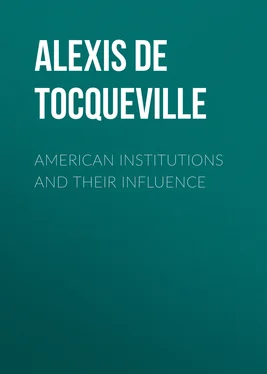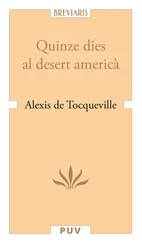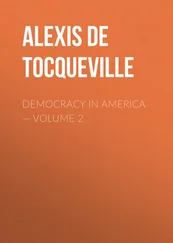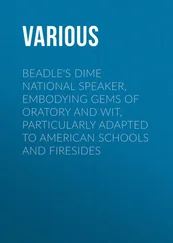Alexis de Tocqueville - American Institutions and Their Influence
Здесь есть возможность читать онлайн «Alexis de Tocqueville - American Institutions and Their Influence» — ознакомительный отрывок электронной книги совершенно бесплатно, а после прочтения отрывка купить полную версию. В некоторых случаях можно слушать аудио, скачать через торрент в формате fb2 и присутствует краткое содержание. Жанр: foreign_antique, Политика, foreign_edu, на английском языке. Описание произведения, (предисловие) а так же отзывы посетителей доступны на портале библиотеки ЛибКат.
- Название:American Institutions and Their Influence
- Автор:
- Жанр:
- Год:неизвестен
- ISBN:нет данных
- Рейтинг книги:5 / 5. Голосов: 1
-
Избранное:Добавить в избранное
- Отзывы:
-
Ваша оценка:
- 100
- 1
- 2
- 3
- 4
- 5
American Institutions and Their Influence: краткое содержание, описание и аннотация
Предлагаем к чтению аннотацию, описание, краткое содержание или предисловие (зависит от того, что написал сам автор книги «American Institutions and Their Influence»). Если вы не нашли необходимую информацию о книге — напишите в комментариях, мы постараемся отыскать её.
American Institutions and Their Influence — читать онлайн ознакомительный отрывок
Ниже представлен текст книги, разбитый по страницам. Система сохранения места последней прочитанной страницы, позволяет с удобством читать онлайн бесплатно книгу «American Institutions and Their Influence», без необходимости каждый раз заново искать на чём Вы остановились. Поставьте закладку, и сможете в любой момент перейти на страницу, на которой закончили чтение.
Интервал:
Закладка:
96
For details, see Revised Statutes of the state of New York, part I, chap, xi., vol. i., pp. 336-364, entitled, "Of the Powers, Duties, and Privileges of Towns."
See in the digest of the laws of Pennsylvania, the words, ASSESSORS, COLLECTOR, CONSTABLES, OVERSEER OF THE POOR, SUPERVISORS OF HIGHWAYS: and in the acts of a general nature of the state of Ohio, the act of 25th February, 1834, relating to townships, p. 412; beside the peculiar dispositions relating to divers town officers, such as township's clerks, trustees, overseers of the poor, fence-viewers, appraisers of property, township's treasurer, constables, supervisors of highways.
97
The author means the state legislature. The congress has no control over the expenditure of the counties or of the states.
98
See the Revised Statutes of the state of New York, part i., chap. xi., vol. i., p. 410. Idem , chap, xii., p. 366: also in the acts of the state of Ohio, an act relating to county commissioners, 26th February, 1824, p. 263. See the Digest of the Laws of Pennsylvania, at the words, COUNTY-RATES AND LEVIES, p. 170.
In the state of New York, each township elects a representative, who has a share in the administration of the county as well as in that of the township.
99
In some of the southern states the county-courts are charged with all the details of the administration. See the Statutes of the State of Tennessee, arts. JUDICIARY, TAXES, &c.
100
For instance, the direction of public instruction centres in the hands of the government. The legislature names the members of the university, who are denominated regents; the governor and lieutenant-governor of the state are necessarily of the number. Revised Statutes, vol. i., p. 455. The regents of the university annually visit the colleges and academies, and make their report to the legislature. Their superintendence is not inefficient, for several reasons: the colleges in order to become corporations stand in need of a charter, which is only granted on the recommendation of the regents: every year funds are distributed by the state for the encouragement of learning, and the regents are the distributors of this money. See chap. xv., "Public Instruction," Revised Statutes, vol i., p. 455.
The school commissioners are obliged to send an annual report to the superintendent of the state. Idem , p. 448.
A similar report is annually made to the same person on the number and condition of the poor. Idem , p. 631.
101
If any one conceives himself to be wronged by the school commissioners (who are town-officers), he can appeal to the superintendent of the primary schools, whose decision is final. Revised Statutes, vol. i., p. 487.
Provisions similar to those above cited are to be met with from time to time in the laws of the state of New York: but in general these attempts at centralisation are weak and unproductive. The great authorities of the state have the right of watching and controlling the subordinate agents, without that of rewarding or punishing them. The same individual is never empowered to give an order and to punish disobedience; he has therefore the right of commanding, without the means of exacting compliance. In 1830 the superintendent of schools complained in his annual report addressed to the legislature, that several school commissioners had neglected, notwithstanding his application, to furnish him with the accounts which were due. He added, that if this omission continued, he should be obliged to prosecute them, as the law directs, before the proper tribunals.
102
Thus the district-attorney is directed to recover all fines, unless such a right has been specially awarded to another magistrate. Revised Statutes, vol. i., p. 383.
103
Several traces of centralisation may be discovered in Massachusetts, for instance, the committees of the town-schools are directed to make an annual report to the secretary of state. See Laws of Massachusetts, vol. i., p. 367.
104
See the constitution of New York.
105
In Massachusetts the Senate is not invested with any administrative functions.
106
As in the state of New York.
107
Practically speaking, it is not always the governor who executes the plans of the legislature; it often happens that the latter, in voting a measure, names special agents to superintend the execution of it.
108
In some of the states the Justices of the peace are not nominated by the governor.
109
The authority which represents the state ought not, I think, to waive the right of inspecting the local administration, even when it does not interfere more actively. Suppose, for instance, that an agent of the government was stationed at some appointed spot, in the county, to prosecute the misdemeanors of the town and county officers, would not a more uniform order be the result, without in any way compromising the independence of the township? Nothing of the kind, however, exists in America; there is nothing above the county courts, which have, as it were, only an accidental cognizance of the offences they are meant to repress.
{This note seems to have been written without reference to the provision existing, it is believed in every state of the Union, by which a local officer is appointed in each county, to conduct all public prosecutions at the expense of the state. And in each county, a grand-jury is assembled three or four times at least in every year, to which all who are aggrieved have free access, and where every complaint, particularly those against public officers, which has the least color of truth, is sure to be heard and investigated.
Such an agent as the author suggests would soon come to be considered a public informer, the most odious of all characters in the United States; and he would lose all efficiency and strength. With the provision above mentioned, there is little danger that a citizen, oppressed by a public officer, would find any difficulty in becoming his own informer, and inducing a rigid inquiry into the alleged misconduct.— American Editor .}
110
China appears to me to present the most perfect instance of that species of well-being which a completely central administration may furnish to the nations among which it exists. Travellers assure us that the Chinese have peace without happiness, industry without improvement, stability without strength, and public order without public morality. The condition of society is always tolerable, never excellent. I am convinced that, when China is opened to European observation, it will be found to contain the most perfect model of a central administration which exists in the universe.
111
A writer of talent, who, in the comparison which he has drawn between the finances of France and those of the United States, has proved that ingenuity cannot always supply the place of a knowledge of facts, very justly reproaches the Americans for the sort of confusion which exists in the accounts of the expenditure in the townships; and after giving the model of a departmental budget in France, he adds: "We are indebted to centralisation, that admirable invention of a great man, for the uniform order and method which prevail alike in all the municipal budgets, from the largest town to the humblest commune." Whatever may be my admiration of this result, when I see the communes of France, with their excellent system of accounts, plunged in the grossest ignorance of their true interests, and abandoned to so incorrigible an apathy that they seem to vegetate rather than to live; when, on the other hand, I observe the activity, the information, and the spirit of enterprise which keeps society in perpetual labor, in those American townships whose budgets are drawn up with small method and with still less uniformity, I am struck by the spectacle; for to my mind the end of a good government is to ensure the welfare of a people, and not to establish order and regularity in the midst of its misery and its distress. I am therefore led to suppose that the prosperity of the American townships and the apparent confusion of their accounts, the distress of the French communes and the perfection of their budget, may be attributable to the same cause. At any rate I am suspicious of a benefit which is united to so many evils, and I am not averse to an evil which is compensated by so many benefits.
Читать дальшеИнтервал:
Закладка:
Похожие книги на «American Institutions and Their Influence»
Представляем Вашему вниманию похожие книги на «American Institutions and Their Influence» списком для выбора. Мы отобрали схожую по названию и смыслу литературу в надежде предоставить читателям больше вариантов отыскать новые, интересные, ещё непрочитанные произведения.
Обсуждение, отзывы о книге «American Institutions and Their Influence» и просто собственные мнения читателей. Оставьте ваши комментарии, напишите, что Вы думаете о произведении, его смысле или главных героях. Укажите что конкретно понравилось, а что нет, и почему Вы так считаете.












